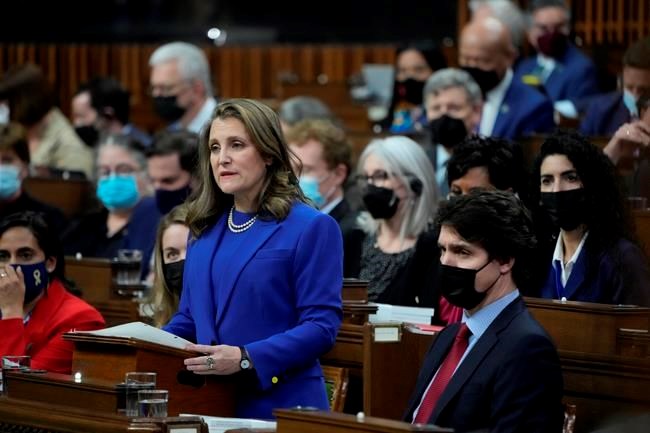OTTAWA — Canadians looking to save a down payment to buy their first home will have a new tax-free savings account to use starting next year.
The federal government announced the Tax-Free First Home Savings Account (FHSA) in the budget Thursday as well as a doubling of the first-time homebuyers' tax credit to up to $1,500 in an effort to make it a little easier to buy a home.
Home prices in Canada have soared over the past year as Canadians have flooded into the housing market over the course of the pandemic, making it difficult for many to find a foothold.
According to the Canadian Real Estate Association, the national average home price hit a record $816,720 in February, up by more than 20 per cent compared with a year earlier.
“As home prices climb, so too does the cost of a down payment,” the government says in the budget.
“This represents a major barrier for many looking to own a home — especially young people.”
Contributions to the new accounts will be tax deductible, just like registered retirement savings plan (RRSP) contributions, and the money in the accounts and any investment gains will not be taxed when it is taken out to buy a qualifying first home.
The accounts will have a $40,000 lifetime limit on contributions and an annual contribution limit of $8,000. Unused annual contribution room will not be carried forward.
In addition to the sharp rise in home prices, Canadians are feeling pinched by inflation as rising prices for everything else take a larger bite out of already stretched household budgets.
Borrowing costs are also rising as the Bank of Canada raises its key interest rate target which has a direct impact on variable rate mortgages. Rates for fixed-rate mortgages have also risen, increasing the costs for first-time buyers opting for more certainty when it comes to the interest rate on their mortgage as well as those who need to renew their mortgages.
Mathieu Laberge, a partner for advisory services and a regional economic and policy leader at KPMG, says the new savings account provides the right incentive for people to save for a down payment on a first home.
"What first-time homebuyers are struggling with right now is to accumulate sufficient capital for a down payment," Laberge says.
"I think it was developed in a way to maximize incentives for savings in the sense that it's like an RRSP. The amounts you put into the account are actually tax free and when you withdraw them, unlike an RRSP, you're not taxed on them."
Laberge says some potential homebuyers might also use the accounts to save for a little longer than they otherwise would and accumulate a little more before making a move on a home, something that may ease demand.
James Laird, co-founder of Ratehub.ca and president of CanWise Financial mortgage brokerage, was disappointed that the house value limit to qualify for mortgage default insurance was not raised from $1 million to $1.25 million, but praised the new saving accounts.
"It is a very strong no-tax vehicle that will actually help Canadians who are trying to save for a down payment," Laird says.
The new account is in addition to Tax-Free Savings Accounts which allow investments to grow tax-free, but don’t generate a tax deduction when you make a contribution.
Homebuyers can also withdraw up to $35,000 from their RRSP accounts to help buy a home, but that money must be repaid.
The government says Canadians will still be allowed to access their RRSP savings under the homebuyers’ plan (HBP) under the existing rules, however they will not be allowed to make both an FHSA withdrawal and an HBP withdrawal to pay for the same qualifying home.
Individuals will also be allowed to transfer funds from an RRSP to an FHSA on a tax-free basis, subject to the lifetime and annual contribution limits.
If a saver does not use the money in their FHSA for a first home purchase within 15 years of first opening the account, the account will have to be closed. Any unused savings may be transferred into an RRSP or RRIF, or withdrawn on a taxable basis.
The new savings accounts are similar to a homebuyer-savings plan Pierre Trudeau introduced in 1975 that research suggests aided the move from renting to home ownership, but which was largely driven by higher-income households before the Mulroney government cancelled the program in 1985.
In addition, the budget includes a new Multigenerational Home Renovation Tax Credit worth up to $7,500 that will help pay for renovations to build a secondary suite for a senior or an adult with a disability.
The budget also includes $475 million in 2022-23 for a one-time $500 payment to those facing housing affordability challenges, but did not include specifics.
This report by The Canadian Press was first published April 7, 2022.
Craig Wong, The Canadian Press



